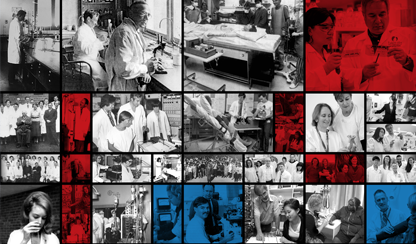20 May 2020
Institute news
Investigator grants to advance understanding of cardiometabolic disease
A significant grant to better understand the role of white blood cell production in cardiovascular disease and to develop novel treatments is one of several prestigious National Health and Medical Research Council (NHMRC) Investigator Grants awarded to Baker Institute scientists.
The grants were announced by the Federal Health Minister, Greg Hunt, today.
Head of the Haematopoiesis and Leukocyte Biology laboratory, Associate Professor Andrew Murphy will receive $2.1m to advance understanding of the immune system and blood cell production process, building on significant work by his group in this area, to devise new ways to regulate this process to treat cardiovascular disease.
In 2011, A/Prof Murphy discovered that an increase in white blood cells accelerates the development of artery-blocking plaque. In 2017, he was awarded a prestigious CSL Centenary Fellowship to advance this work. Now, with the help of this investigator grant he aims to further understanding of how the blood cell production process changes in the setting of chronic inflammatory diseases, and how this accelerates cardiovascular disease.
Research officer in the Metabolomics laboratory, Dr Kevin Huynh has been awarded more than $645,000 to investigate plasma and immune cell lipidome to identify markers for the diagnosis of Alzheimer’s disease, and to develop risk models for future onset and monitoring of disease progression. Recent studies have identified multiple genes that confer risk to Alzheimer’s disease, all of which are heavily involved in lipid metabolism. His work aims to focus on lipids within immune cells which may provide crucial biological information important in disease screening, risk prediction and pathology monitoring.
Dr Nitesh Nerlekar from the Institute’s Imaging Research laboratory will receive more than $645,000 to examine breast arterial calcification, which can be identified in mammography screening for breast cancer, as a potential option to identify cardiovascular disease. Exploring this relationship holds great promise as a primary prevention screening tool for women, which is critical as cardiovascular disease remains the leading cause of death in women in the Western world. Current screening algorithms are outdated and inconsistent in estimating future risk so novel diagnostic options such as this are critical.
Dr Aleksandr Voskoboinik from the Alfred Health Department of Cardiology and the Baker Institute’s Clinical Electrophysiology laboratory has secured more than $600,000 to undertake studies to improve outcomes in patients with life-threatening ventricular arrhythmias or heart rhythm disorders. One study will look at improving defibrillation success in cardiac arrests that occur outside of the hospital to improve survival and health outcomes.
Baker Institute Director, Professor Tom Marwick said cardiovascular disease remained the biggest killer of Australians and the most costly disease in the country, while diabetes and Alzheimer’s disease are among the fastest growing chronic diseases.
“This is where the greatest need for new prevention, diagnostic and treatment options is,” Professor Marwick said. “We thank the NHMRC for investigating in these areas of critical need but appeal for greater investment to match this urgent need in the near future.”





